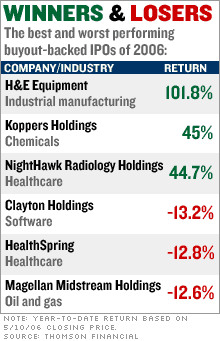|
IPOs: Don't fear 'The Flip'
Private equity backed deals raise several concerns, but the story isn't all doom and gloom.
NEW YORK (CNNMoney.com) - Private equity-backed companies often come to the market with plenty of baggage, but that doesn't mean investors should always take flight. Private equity investors are notorious for loading the businesses they invest in with debt and pocketing rich rewards by taking these companies public. With an eye on the heavy debt burdens of these firms, several in the IPO market are feeling lukewarm towards these so-called private equity flips.
For instance, when mattress maker Sealy (down $0.27 to $14.90, Research) went public last month, it warned that its substantial debt levels could pose a risk to its business. Shares of the company, which is owned by KKR, the world's largest buyout firm, have languished and are currently trading below their offering price of $16 a share. If it looks like private equity firms are just cleaning house and trying to make money for themselves, then that should ring alarm bells for investors, according to Tom Taulli, author of Investing in IPOs. But private equity in and of itself isn't a bad thing, he said. Burger King, another private equity-backed firm set to make its debut this week, also has a significant debt burden, and insiders have paid themselves a hefty $400 million payout. But despite those concerns, the fast-food chain's "attractive valuation and solid fundamental outlook could serve investors some nice returns over the long run," analysts at Renaissance Capital's IPOhome.com wrote in a recent report. Facilitated by expanding debt markets, private equity firms have been on a roll, scooping up closely held companies and selling them quickly. But the era of buying and "flipping" companies is over, according to Colin Blaydon, director of the Center for Private Equity and Entrepreneurship at Dartmouth's Tuck School of Business. "Debt markets are stable, and nobody really is flipping companies. They [private equity firms] really have to figure out how to add value and build the company and then look very carefully at where they're going to exit," he said. Private equity firms generally use their own money and borrowed funds to turnaround distressed companies. When a firm has been overhauled, it's common for the investors to either sell the company to a corporate buyer or take it public. Not so nefarious?
While private equity firms attract a lot of attention for the huge amounts of debt they often load onto companies, they also can improve business operations, which can benefit public shareholders. "Buyout companies are very focused on creating leaner companies, and they have a lot of discipline because they have a lot of debt hanging over their head," Blaydon said. Private equity firms also tend to invest in more mature companies, which can pose less risk for investors than younger firms. "Historically the private equity-backed deals tend to be with more mature companies in non-sexy industries which have not suffered from inflated investor enthusiasm," said Jay Ritter, a professor of finance at the University of Florida who studies IPOs. He tracked the performance of companies that went public from 1985 to 2002 and found that private equity-backed firms slightly beat the market in the three years after going public, whereas other IPOs somewhat underperformed the market. But he stressed, past performance isn't a guarantee of future success. "It definitely is the case that debt levels in private equity-backed IPOs are higher than for other IPOs and that does increase the financial risk, but that leverage can also result in more upside potential for equity holders," said Ritter. Warning signs
"Private equity-backed companies are not doomed for failure," Taulli said. If there's a strong growth component, these firms can have strong legs in the market, he said He cited the example of VeriFone (up $0.44 to $29.98, Research), a provider of electronic payment equipment, including check verification and credit authorization devices. The former Hewlett-Packard unit was taken public by private equity firm GTCR Golder Rauner last May, and shares have nearly tripled since then. With any initial public offering, investors should scrutinize the company's income statement and balance sheet to evaluate its performance and prospects. But since private equity investors generally maintain a majority share of the companies they take public, these deals can raise additional shareholder concerns, according to Nell Minow, co-founder of the Corporate Library, a corporate governance research firm. Investors should be on the lookout for any signs that insiders are jumping ship, she said. "What you want to see is involvement with the private equity people going forward. You want to see they're not trying to offload some kind of problem." At the same time, investors want to look for signs that private equity firms are committed to shareholder accountability. Investors can gauge that by checking to see if the board will be comprised of independent directors or if insiders have accepted restricted stock that they can't sell for a certain amount of time, Minow added. ------------------- Here come the big IPOs -- click here.
Click here for a look at this week's upcoming IPOs. |
|



